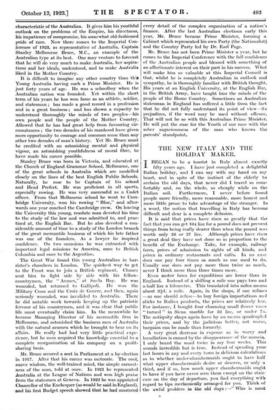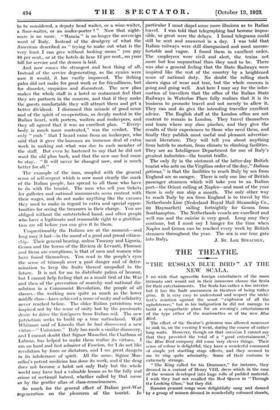THE NEW ITALY AND THE HOLIDAY MAKER.
IBEGAN to be a tourist in Italy almost exactly fifty years ago. I have just completed a delightful Italian holiday, and I can say with my hand on my heart, and in spite of the instinct of the elderly to acclaim the old days, that never did I travel so com- fortably and, on the whole, so cheaply while on the Italian soil. Furthermore, I never before found people more friendly, more reasonable, more honest and more little prone to take advantage of the stranger. In a word, the notion that travelling in Italy has become difficult and dear is a complete delusion.
It is said that prices have risen so greatly that the fact that you can get 104 lire for a pound does not prevent things from being really dearer than when the pound was worth only 26 or 27 lire. Although prices have risen a great deal they have not done so in proportion to the benefit of the Exchange. Take, for example, railway fares, prices of admission to sights of all kinds, and prices in ordinary restaurants and cafes. In no case does one pay four times as much as one used to do. Usually one does not pay more than twice as much, never I think more than three times more.
Even motor fares for expeditions are lower than in England. Instead of a shilling a mile one pays two and a-half lire a kilometre. This translated into miles means about 91d.. a mile. Again, in the shops, if one refuses —as one should refuse—to buy foreign importations and sticks to Italian products, the prices are relatively low. For instance, I bought four charming small flower vases " turned " in Siena marble for 32 lire, or under 7s. The antiquity shops again have by no means quadrupled their prices, and by the judicious better, not worse, bargains can be made than formerly. A very great decrease in expense as in worry and humiliation is. caused by the disappearance of the mancia. I only heard the word twice in my four weeks. This sounds incredible but is true. Instead of spending your last hours in any and every town in delirious calculations as to whether under-chambermaids ought to have half what upper chambermaids desire or deserve, or only a third, and if so, how much upper chambermaids ought to have if you have never seen them except on the stair- case on the day of departure, you find everything with regard to tips mechanically arranged for you. Think of the awful problem in the old days. :—" Who is most to be considered, a deputy head waiter, or a wine-waiter, a floor-waiter, or an under-porter ? " Now that night- mare is no more. "Mancia " is no longer the sovereign word of Italy. Instead of the drudgery of what the American described as "trying to make out what is the very least I can give without looking mean" you pay 10 per cent., or at the hotels de luxe 12 per cent., on your bill for service and the demon is laid.
And now comes the strangest and best thing of all. Instead of the service degenerating, as the cynics were sure it would, it has vastly improved. The itching palm did not make for good work or for friendliness, but for disorder, suspicion and discontent. The new plan makes the whole staff in a hotel or restaurant feel that they are partners in the concern, and that if they make the guests comfortable they will attract them and get a better dividend. I discussed this miracle of good sense and of the spirit of co-operation, so deeply rooted in the Italian heart, with porters, waiters and innkeepers, and they all agreed that it was an excellent plan. "Every- body is much more contented," was the verdict. The only " crab " that I heard came from an innkeeper, who said that it gave the bureaux an immense deal of extra work in making out what was due to each member of the staff. But even he hastened to say that he did not want the old plan back, and that the new one had come to stay. "It will never be changed now, and is much better for all."
The example of the inns, coupled with the general sense of self-respect which is now most clearly the mark of the Italian people, has spread to all those who have to do with the tourist. The men who sell you tickets for galleries and national monuments seem content with their wages, and do not make anything like the excuses they used to make in regard to extra and special oppor- tunities for seeing the treasures in their charge. You are obliged without the outstretched hand, and often people who have a legitimate and reasonable right to a gratifica- tion arc off before you can give it to them.
Unquestionably the Italians are at the moment—and long may it last—in the mood of a good and proud citizen- ship. Their general bearing, unless Tuscany and Liguria, Genoa and the towns of the Riviera de Levanti, Florence and Siena are exceptions, is that of men and women who have found themselves. You read in the people's eyes the sense of triumph over a past danger and of deter- mination to keep the fruits thereof unspoiled in the future. It is not for me to distribute palms of honour, but I cannot help feeling that as a result first of the War and then of the prevention of anarchy and national dis- solution in a Communist Revolution, the people of all classes—the working men quite as much as the lower middle class—have achieved a sense of unity and solidarity never reached before. The older Italian patriotism was inspired not by the sense of unity but by the passionate desire to drive the foreigners from Italian. soil. The new patriotism seeks to build up a true nationhood. Walt Whitman said of Lincoln that he had discovered a new virtue—" Unionism." Italy has made a similar discovery, and I cannot doubt that Signor Mussolini, the Chatham of Labour, has helped to make them realize its virtues. I am no hard and fast admirer of Fascism, for I do not like revolution by force or dictators, and I sec great dangers in its intolerance of spirit. All the same, Signor Mus- solini's potent medicine has done its work, and if the drug does not become a habit not only Italy but the whole world may have had a valuable lesson as to the folly and crime of sectional hatred, whether called by that name or by the gentler alias of class-consciousness.
So much for the general effect of Italian post-War regeneration on the pleasures of the tourist. In particular I must dispel some more illusions as to Italian travel. I was told that telegraphing had become impos- sible, so great were the delays. I found telegrams could still be sent and answered in a day. I was told that Italian railways 'were still disorganized and most uncom- fortable and vague. I found them in excellent order. The employees were civil and alert, the trains not more but less unpunctual than they used to be. There was also a general feeling that the State Railways were inspired like the rest of the country by a heightened sense of national duty. No doubt the rolling stock shows signs of wear and tear, but the whole concern is going and going well. And here I may say for the infor- mation of travellers that the office of the Italian State Railways in Waterloo Place fully realizes that it is its business to promote travel and not merely to allow it. They can and do give the intending traveller excellent advice. The English staff at the London office are not content to remain in London. They travel themselves and learn where any shoe pinches, and they give the results of their experiences to those who need them, and finally they publish most useful and pleasant advertise- ment literature. They will tell you about anything from hotels to motors, from climate to climbing facilities. They are an Intelligence Department for one of Italy's greatest industries—the tourist traffic.
The only fly in the ointment of the latter-day British tourist who acts on the Virgilian order of the day, "Italiam petimus," is that the facilities to reach Italy by sea from England are so meagre. There is only one line of British passenger steamers which will take you to an Italian port—the Orient calling at Naples—and most of the year there is only one ship a month. The only other way to reach Italy by sea from England is to travel by the Netherlands Line (Nederland Royal Mail Steamship Co., 60 Haymarket) sailing fortnightly for Genoa from Southampton. The Netherlands vessels are excellent and well run and the cuisine is very good. Long may they continue, but I must say I hunger for the time when Naples and Genoa can be reached every week by British steamers throughout the year. The sea is our true gate



























































 Previous page
Previous page